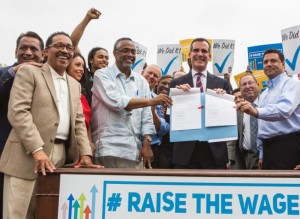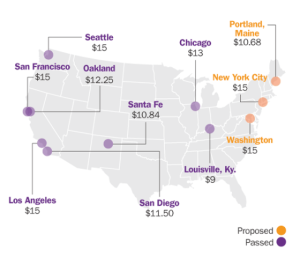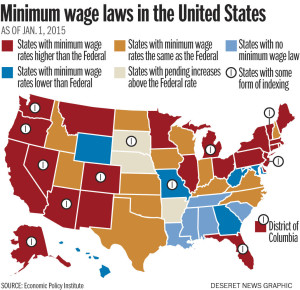
I’m not a mean-spirited person (at least not after I’ve had my morning coffee) but I worry that writing about recent minimum wage law changes could lead some friends to accuse me of heartlessness. I don’t mean to be heartless.
The Los Angeles City Council recently voted 14-1 to raise the employee minimum wage in the city to $15 an hour, up from $9 an hour, in a gradual phase-in through the year 2020.
Meanwhile, New York City raised the minimum wage hike for fast food restaurant workers. Minimum wage hikes are ‘in the air’ as an urban policy idea nationwide.
While I don’t doubt the excellent intentions of the Los Angeles city council and their supporters, my immediate finance-guy reaction is to suspect that the minimum wage hike will leave many of the intended beneficiaries of this law worse off.
Wage island problem
Passing a private sector minimum wage law in a limited area – like within a single city’s boundaries – seems to me an invitation to employers to move businesses just outside city limits, or to consider starting businesses away from high-wage cities.

I know if I were an entrepreneur in Los Angeles this law might make me more likely to look to build or grow my business away from the city.
Clearly some service industries like retail stores and restaurants that depend on urban density cannot relocate away from a higher-wage area like Los Angeles.
But many other types of businesses can relocate to outside of a city limit, or can be started away from a city.
Most vulnerable workers
Employees with experience and specialized skills have significant leverage when setting their pay. Employers often complain that they cannot find enough skilled workers to fill their company’s needs.
Employees seeking a minimum wage job, by contrast, lack specialized skills or relevant experience unique for their job. They might be too young to have worked much, or they might lack desirable educational degrees. If they are older workers, they may have a checkered employment history or background. Employees seeking minimum wage work need a chance to build up experience or a track record to prove their worth to an employer. The minimum wage job could (and should) be the entry-level step, an on-ramp to higher skills and higher pay.
I’ve been an employer and an entrepreneur, and one of the scariest things for a small business is hiring new employees. Before the employee starts, you don’t how it all will work out. New hires, in fact, often don’t work out. You end up losing time, money and resources with new employees, in addition to suffering a spike in unemployment insurance rates for your business.
As an employer in Los Angeles, I might go to great lengths to avoid hiring an unskilled, untested worker at $15 an hour, compared to the federal minimum wage of $7.25 per hour.
I would hire fewer people, more reluctantly. I would lean on my proven, experienced workers more. I would seek to substitute automated processes for human processes. I would figure out a way to get by on fewer workers, because of the clear difference in my bottom line survival as a business.
Multiply that effort by tens of thousands of employers and I think you’ve got the makings for many fewer entry-level job opportunities in a high minimum wage area. I think you’ve got the making of higher unemployment rates in Los Angeles compared to outside the city.
Leap of Logic
Forgive me for the following leap of logic, in which I mention an extremely complex economic situation and simplify it for my purposes, but I think it relevant to mention that France’s official unemployment rate hovers above 10%. In a related story, France’s minimum wage is approximately three times higher than in the US, according to Thomas Piketty, the author of Capital In The Twenty-First Century.
Of course that’s not the whole story. There are undoubtedly many reasons for structural differences in France’s unemployment rate when compared to the United States’ rate, currently a little over 5%. But most people would agree that they have something to do with the well-intentioned worker protections in place in France. Those worker protections – which include minimum wages, in addition to rules about firing, and the social safety net – have great effects on both employee and employer behavior.
If you talk to an employer in France, they will describe their extreme reluctance to hire anyone, because of these protections.
Unintended consequences
The goal of minimum wage laws is to ensure better living conditions for the most vulnerable workers in an economy, by definition folks earning the least amount of money per hour that an employer may legally pay. But if the result is fewer jobs for that most vulnerable population, then is the law hurting or helping?
3.8 million people live in Los Angeles, with an estimated 800,000 affected by this change in the law. Each 1 percent increase in the unemployment rate among that population could mean 8,000 fewer people with any job at all.
Those 8,000 would be the most hurt by this minimum wage hike with only a 1% rise in unemployment. A move to France-like unemployment rates would mean 40,000 people in the Los Angeles area without a job. While that’s too extreme an effect to be likely, I do worry that well-intentioned city policy hurts the very people it’s meant to help.
You know what’s another possibility though? I’m totally wrong. I’ll discuss that, as well as San Antonio’s current proposal regarding minimum wages, in a subsequent column.
A version of this post appeared in the San Antonio Express News.
Please see upcoming post on
San Antonio’s minimum wage for government workers
Post read (906) times.

